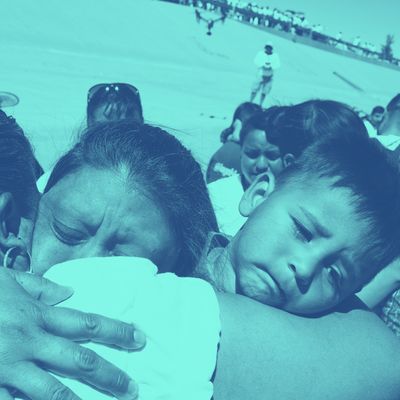
From the day their child is born, most parents are readying themselves for the separations, large and small, that they’ll inevitably face, from dropping their kid off at the first day of school, to the first time they move out of the house as a new adult. But when a separation happens when it’s not supposed to — unexpectedly, non-consensually, because of circumstances beyond the parent’s control — it becomes what human development experts call an “off-time life event,” and it can turn a parent’s identity upside-down.
“It goes against the normal expectations a parent might have over the course of that young person’s life,” says clinical psychologist Mia Smith-Bynum, a professor of family science at the University of Maryland. For a recent, particularly devastating example: Since this past October, as the New York Times recently reported, the number of migrant children forcibly separated from their parents at the U.S. border (a policy that chief of staff John Kelly has called “a tough deterrent”) has swelled into the hundreds — more than 700, to be more specific, including more than 100 children younger than 4 years old.
The figure cited by the Times was from this past April; by now, that number has likely climbed even higher. Some of the parents of those children have already been deported, leaving behind kids who remain in U.S. detention centers; others remain in custody, starved for information on their children’s whereabouts. Most of those parents don’t know when, if ever, they’ll see their children again — a situation that sets these parents up for myriad forms of psychological and emotional suffering, both immediate and long-term.
While there’s plenty of research out there on how children are affected when they’re separated from their parents, studies from the other side — looking at the effects on the parents — are limited, says Shauna Tominey, a parenting researcher at Oregon State University, and tend to focus on separations that happen as a result of divorce, incarceration, or military deployment. What we do know, though, is that in those cases, parents and children alike can more easily cope with being apart “when there is some level of predictability, some sense of routines or patterns or new creation of routines or patterns,” says Tominey.
“When the separation is sudden, unexpected, and forceful,” she adds, “none of that is true.”
Forceful separation is particularly damaging, explains clinical psychologist Mia Smith-Bynum, a professor of family science at the University of Maryland, when parents feel there’s nothing in their power that can be done to get their child back.
Regardless of perceived levels of control, she says, a grief response — “sadness and despondency, problems sleeping, tearfulness, changes in energy, problems keeping up with a daily routine” — is to be expected after a separation. But when a parent lacks a list of concrete steps they can take to regain custody (Smith-Bynum cites the example of a parent who enters treatment for substance abuse after an intervention from child protective services), that sense of helplessness can mean that the symptoms of grief are compounded by symptoms of post-traumatic stress disorder, including nightmares, emotional numbness, and an inability to stop reliving the separation over and over.
Feeling — and being — powerless over your child’s fate can also lead to something called “ambiguous loss,” in which a parent never gets the closure they need to fully resolve their grief. “You know your kid is out there, but you don’t know if you’ll be able to parent and take care of your kid again,” Smith-Bynum says, which makes it harder to reach for the typical coping mechanisms that can help a parent through a loss. “People become frozen in their grief.”
Having a strong social support network in place has been shown to help people more easily cope with major stresses, Tominey notes, which brings up a bitter irony in the case of parents whose children are taken from them at the border — their loss is both the cause of stress and the thing that prevents them from staying emotionally resilient in the face of it.
“The approach is a punishment,” she says, “intended to cause harm.” Based on what we know about the psychological havoc that forced separation can wreak, it’s strikingly effective at doing so.




